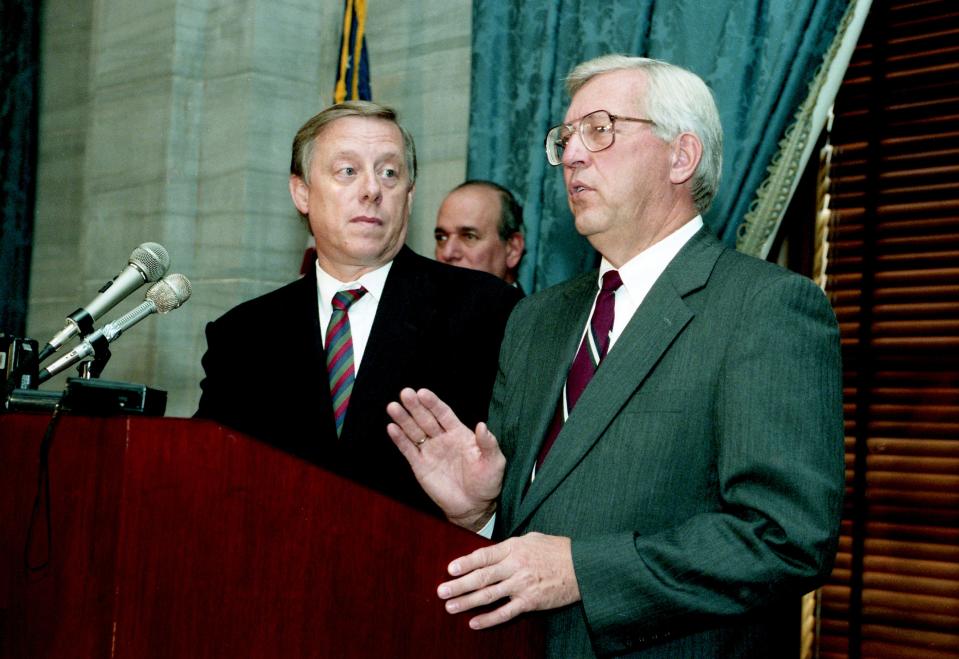Former Tennessee Gov. Don Sundquist did much more than propose an income tax. Here are a few examples.
- Oops!Something went wrong.Please try again later.
- Oops!Something went wrong.Please try again later.
I first met Don Sundquist in 1980, just before the Arkansas precinct caucuses of that year, when Senator Howard H. Baker Jr. was briefly running for President.
I was part of a (very) small entourage on a daytrip from Nashville over to two Arkansas towns – Batesville and Bentonville. Gov. Lamar Alexander would be speaking to two dinner-time groups of Republican caucus voters, hoping to boost their support for Tennessee’s distinguished senior senator.
At this point, Sundquist did not hold any public office as yet. He would not go to Congress until two years later, and he would not be Tennessee’s governor himself (1995-2003) until 12 years after that. But in 1980, at age 44, Sundquist had already been chair of the national Young Republicans in the early 1970s and he was now Baker’s presidential campaign manager.
Don’s passing the other day stirred memories for me from that 1980 excursion to the far side of the Mississippi River, and of his later two terms in the Tennessee governor’s office. Many who look back to that time now insist on talking about the fight over a state income tax, which arguably ended Don’s career in politics. But my thoughts also go back to these successes.
Hear more Tennessee Voices: Get the weekly opinion newsletter for insightful and thought provoking columns.
Sundquist defied expectations and won his congressional seat against a strong opponent
Election to Congress: In 1982, Bob Clement had his eye on the old Seventh District seat in Congress. So did Sundquist. By this time, Clement had been elected statewide to the old Public Service Commission, and he was president of Cumberland University in Lebanon. Governor Alexander advised Don to avoid this race which would pit him against the politically potent Clement family name, but Don persisted and took the seat. He would ultimately hold it for six two-year terms.

TennCare: When Sundquist was elected governor in 1992, he soon inherited responsibility for the TennCare program, which had been the Gov. Ned McWherter administration’s bold re-invention of the federal Medicaid program here.
The Sundquist team’s oversight found management trouble among the new, untested managed-care organizations central to the program. This was accomplished. Sundquist staffer Wendell Moore recalls the new governor never blamed any of the trouble on his predecessor. He regarded Governor McWherter a personal friend, though they came from opposing political traditions.
Families First: This was Tennessee’s response in the 1990s to new federal priorities for adding work requirements for welfare recipients, promoted by the Democratic Clinton-Gore administration and also boosted by congressional Republicans. Many eyes would be watching its progress through the Sundquist administration and legislature here. When Sundquist’s implementing legislation went to the General Assembly, its co-sponsors came from both sides of the political aisle.

Ultimately, the Families First reform program was credited with reducing the number of Tennessee families on welfare from 70,000 to 30,000 and moving more of them to paying employment. (A 2001 study of 400 families found that 69% had either found a new job or reported a pay raise, and 67% were now employed full-time.)
Sign up for Latino Tennessee Voices newsletter:Read compelling stories for and with the Latino community in Tennessee.
The former governor was key to making Tennessee an automotive industry powerhouse
Nissan’s U.S. Headquarters: Tennessee had become a major automotive manufacturing center in the middle 1980s. Some twenty years later, Nissan was internally looking for a new headquarters city for its U.S. operations. This became a high priority for Sundquist’s economic-development team.
Sundquist led an important trip to Washington, D.C., for a high-level private meeting with the Nissan CEO Carlos Ghosn. He took with him a bipartisan delegation from Tennessee that included Gov.-elect Phil Bredesen, Nashville Mayor Bill Purcell, and others. Their objective was to assure Ghosn that there would be no interruption in Tennessee’s top-level commitment to the automaker through the coming change of administrations in Nashville, from Republican to Democratic.
That initiative paid off, though Nissan did not announce its headquarters move to Franklin until several years into Bredesen’s time in office.
Sign up for Black Tennessee Voices newsletter:Read compelling columns by Black writers from across Tennessee.
Bipartisan message: 'We need to have more who can have a heart'
In 2014 Sundquist was invited to speak at a charity roast for Nashvillian Gordon Bonnyman, leader of the Tennessee Justice Center.
The two men had clashed over state welfare policy throughout Don’s administration, from TennCare to Families First. Bonnyman told me he believed the Sundquist team had had the interests of program recipients at heart. Families First was working.
This might have been a hostile room, and Don might have declined the roast invitation, but he accepted and went. And that evening when he spoke, what he said to Bonnyman was this:
“All Republicans can have a heart, and we need to have more who can have a heart. It’s probably true for some Democrats, as well. Gordon, I hope one of us makes it to the Pearly Gates – I hope both of us – but whichever of us makes it first, we need to tell St. Peter, ‘We tried to make it work.’”
USA TODAY Network Tennessee columnist Keel Hunt is the author of four books on Tennessee political history, including “Crossing the Aisle: How Bipartisanship Brought Tennessee to the 21st Century and Could Save America.” Read more at KeelHunt.com
This article originally appeared on Knoxville News Sentinel: Late Tennessee Gov. Don Sundquist did more than propose an income tax

